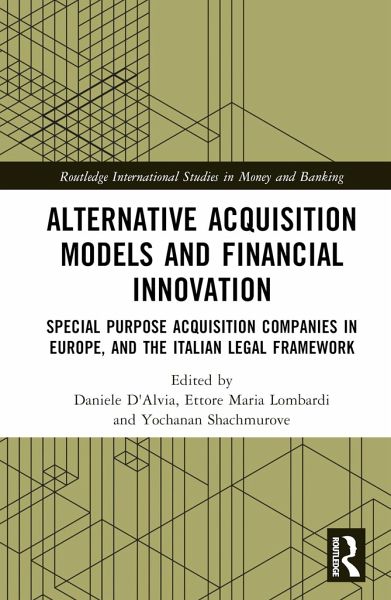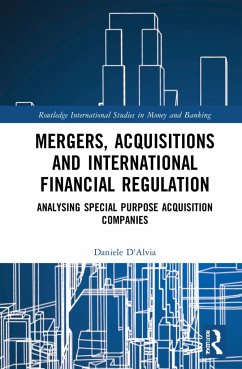
Alternative Acquisition Models and Financial Innovation
Special Purpose Acquisition Companies in Europe, and the Italian Legal Framework
Herausgegeben: D'Alvia, Daniele; Lombardi, Ettore Maria; Shachmurove, Yochanan
Versandkostenfrei!
Versandfertig in 6-10 Tagen
45,99 €
inkl. MwSt.
Weitere Ausgaben:

PAYBACK Punkte
23 °P sammeln!
This is the first book written in English on special purpose acquisition companies (SPACs) in the context of European and Italian financial law, introducing the topic with a general overview on the European stage. It is also the first book on European financial regulations of SPACs. As such, it is a groundbreaking reference text for SPAC studies at the international level.Alternative Acquisition Models and Financial Innovation: Special Purpose Acquisition Companies in Europe, and the Italian Legal Framework offers the most comprehensive overview of the current international financial regulatio...
This is the first book written in English on special purpose acquisition companies (SPACs) in the context of European and Italian financial law, introducing the topic with a general overview on the European stage. It is also the first book on European financial regulations of SPACs. As such, it is a groundbreaking reference text for SPAC studies at the international level.
Alternative Acquisition Models and Financial Innovation: Special Purpose Acquisition Companies in Europe, and the Italian Legal Framework offers the most comprehensive overview of the current international financial regulations of SPACs in the EU and UK compared to the main legal system where SPACs originated-the US. This edited book is focused on finding a European legal framework for SPACs by discovering whether the Alternative Investment Fund Managers Directive (AIFMD) or the Undertakings for the Collective Investment in Transferable Securities Directive (UCITS) are applicable to them and why, as well as identifying the objectives of financial regulation of SPACs in the EU, US and UK.
Essentially, the edited collection explores soft law and self-regulation instances against the state-based Westphalian approaches centred on hard law instances; describes practical examples of SPACs in Italy and Europe; and analyses the limits and perspectives of such investment vehicles on the Italian capital market as well as their possible uses as forms of shadow banking and venture companies at international levels.
Alternative Acquisition Models and Financial Innovation: Special Purpose Acquisition Companies in Europe, and the Italian Legal Framework offers the most comprehensive overview of the current international financial regulations of SPACs in the EU and UK compared to the main legal system where SPACs originated-the US. This edited book is focused on finding a European legal framework for SPACs by discovering whether the Alternative Investment Fund Managers Directive (AIFMD) or the Undertakings for the Collective Investment in Transferable Securities Directive (UCITS) are applicable to them and why, as well as identifying the objectives of financial regulation of SPACs in the EU, US and UK.
Essentially, the edited collection explores soft law and self-regulation instances against the state-based Westphalian approaches centred on hard law instances; describes practical examples of SPACs in Italy and Europe; and analyses the limits and perspectives of such investment vehicles on the Italian capital market as well as their possible uses as forms of shadow banking and venture companies at international levels.














